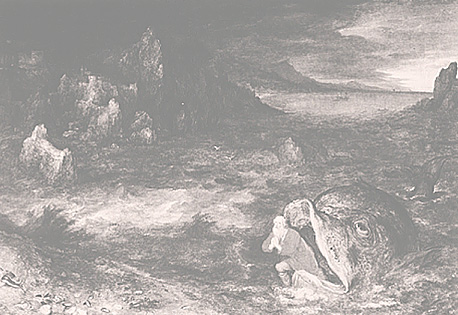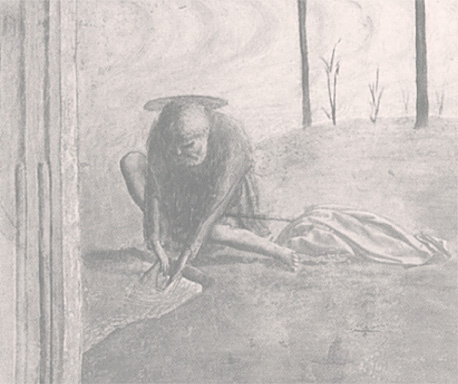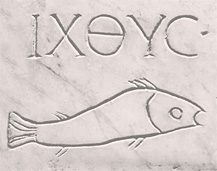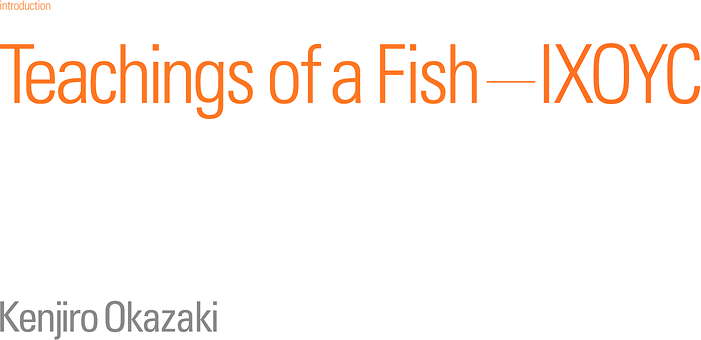The man appearing out from the fish’s mouth is the prophet Jonah. It is a scene from the “Book of Jonah” in the Old Testament painted by Jan Brueghel. Jonah refuses God’s call to deliver the prophecy to the pagan city of Nineveh in Assyria and flees on a ship. His ship encounters a storm, and realizing that the cause lay in his betrayal of God’s orders, Jonah makes the ship’s crew throw his body off board into the sea. A giant fish (probably a whale) devours Jonah, and after three days and three nights (during which Jonah spent inside the fish’s belly), vomits him out of its mouth. The place he is thrown out is on the shores of Nineveh. The thrown-out body of Jonah arrives to Nineveh regardless of his own intentions. For the citizens of Nineveh who witnessed the event, the fact that a human being is thrown out of a whale is in itself already miraculous. In other words, even before Jonah threw (communicated) God’s prophecy out of his mouth, the whale throwing out Jonah is already a divine prophecy by itself. Rather than Jonah telling something through his mouth (his words), his very body becomes the words of God. Jan Breughel depicts this scene, where Jonah, being those words of God, is thrown from the mouth of the whale.

- Jan Brueghel the Elder,
Jonah Leaving the Whale,
Oil on panel
38×56cm, 1600
As is well known, the story of Jonah in the Old Testament is regarded as a prototype or a typology of the passion of Jesus in the New Testament. Jesus receives a worldly body, and is finally crucified and resurrected after three days. The spirit of Jesus disappears from the world (but is not yet in heaven, and thus is completely without place) and becomes absent for the same amount of time Jonah spent inside the fish’s belly. During these three days, Jesus is totally reduced to matter (dead body). Precisely speaking, the incarnation of Jesus refers to these three days.
The words of Jesus in the New Testament bear a constant duplicity. They are always divided into two voices or two standards: that of the human secularity and divine authority. They thus are indirect and allegorical at all times.
However, Jesus after becoming a dead body no longer speaks for himself. Like Jonah, the body of Jesus itself becomes the very matter thrown out by God, the incarnated words of God. Subsequently earthly men (who, contrary to Issac’s story in the Old Testament, sacrificed God’s son) are forced to live within the question of how to respond to this sacrifice bestowed to them by God, the word as matter or word without word. The objective of sowing the faith for God (precisely as a seed) has already acquired its necessary condition. The external existence of God is sowed as a program to the bodies of each individual man.
Matthew of “The Gospel according to Matthew” was originally a tax collector. Thus his gospel is fraught with monetary and financial metaphors. The propagation of Jesus’ teachings is often modeled on the growth of capital. In monetary economy the body (of a worker) is made aware of its own (work) value by becoming exchanged with other bodies via money. Commodities also confirm its humanistic value (which connects work with use) or subjectivity by becoming exchanged with other products via money. It is then that commodities (including workforce) realize what it is to be humanistic for the first time (in the form of alienation).
The propagation of faith is isomorphic to this problem. Within this exchange process, money is the sacrificed body or the body of Jesus so to speak. In other words, it is a commodity deprived of an actual utility value. This soul-deprived (dead) commodity functions nevertheless as a Master for other commodities. The body of Jesus or the gift from God thus becomes distributed into other bodies (of humans not yet humans) and keeps on increasing. Just like the growth of capital.
Now, Jonah becomes enraged because God saves the city of Nineveh against his own prophecy. Even though his own existence (body) engaging in missionary work was the actual cause for saving the city, his anathematic feelings for the city never changed. God grows a castor bean tree beside the ill-tempered Jonah sitting in the sun, and provides him with shade. But soon afterwards, the same God appoints an aphis that devours and kills the tree. Jonah expresses his anger towards God for blighting the plant, which had nevertheless been given to him by God only a day before. God laughs and admonishes Jonah who is as aggravated as if the castor bean tree was his own body. Jonah does not realize that he himself was bestowed to Nineveh just like the castor bean tree had been bestowed to him. Or maybe it is that for God, Nineveh was the castor bean tree and Jonah the aphis. In either way, be it the tree or Jonah, or any human being, each existence cannot ultimately know its own value or significance by itself. The awareness is reached only through the exchange with, or transference to, other objects.
The painting of Breughel immediately brings to mind the mural painting of Brancacci Chapel entitled “Rendering of the Tribute Money” by Masaccio. The “Rendering of the Tribute Money” is an extremely distinct theme that only appears in “The Gospel according to Matthew,” in which Jesus pays tax to the Roman Empire, but this can be understood clearly from the above context. Jesus orders Peter, an ex-fisherman, to take some money out of the mouth of a fish in the ocean and pay it as the tax (and Jesus himself was, equal to this money appearing from a fish’s mouth, a foreign matter thrown into the Roman Empire).
What controls Rome is thus something that comes out of a fish’s mouth, money as a foreign matter (prohibited to own any actual function or life). And in due course, a different foreign matter named Jesus will appear, making aware of another spirit and a network based on this spirit. Here, the term ‘spirit’ refers to an invisible center, (and therefore the ultimate) objective or intention, which regulates and controls the network of various objects and phenomena (or which is intrinsic to the movement of such network and enacts it). This objective or intention (lets call this entelecheia after Aristotle) is intrinsic to movement and not external to it. That is why it cannot be translated into any other language. It is the ultimate objective which makes movement become a movement and a necessity. However, this objective was none other than a death evacuated of every single function, death as a foreign matter thrown out in the center of movement. This thrown out matter is what we call “soul” ― a spirit. In the same way that there is no more death for death itself, “soul” is always already immortal. It exists (is thrown out) in the exterior of life from the beginning. Jesus as the Resurrection? That is IXOYC, the teachings of a fish.

- Masaccio,
Tribute Money(detail),
Fresco
255×598cm, 1426-27

- ΙΧΘΥΣ
IKTUS.
Means 'Fish' in Greek.
It was used along with
a fish-shaped icon
as a secret code for Jesus
by the early Christians.
